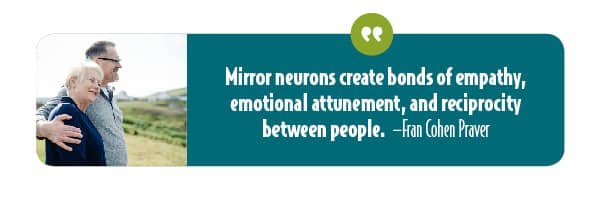What determines a successful marriage? Do you know?
Many couples want to have a healthy relationship yet struggle to know how. Why can most couples instantly tell when their partner is upset with them, but not know how to create the understanding and honesty necessary to resolve conflict?
This ability is a crucial factor that builds successful and long-term marriages, so how is it that it's commonly lacking?
CONTENTS OF BLOG Click to jump to the section of your choice.
Brains Are Wired for Relationship—So Why All the Conflict?
Why We Hurt the Ones We Love
Mature and Unconditional Love Requires Self-Awareness
Take Responsibility for Your Emotion and Unresolved Pain
The Polarity of Magnets: Are You Repelling Love or Creating Closeness?
7 Tips to Create More Unity, Love, and Connection in Your Relationship
On the contrary, couples can identify their partner's exact looks, facial expressions, body language, and the myriad ways that they are upset.
In these fights and relationship conflicts, a love seat is not a love seat—it's way too small, and the distance between the couple too great for any genuine connection.
So why do two people in love often reach this crossroads and get stuck?
Brains Are Wired for Relationships—So Why All the Conflict!?
You probably already know that our brains are wired for survival. Negative or threatening experiences invoke unpleasant emotions, like fear, that signal our need to protect ourselves until we feel safe again.
The person we love and share a deep commitment with often evokes these intense emotional reactions. Seeking safety can look very different for every couple. A partner might pout, yell, criticize, get sarcastic, drink too much, or give the silent treatment, even for days—our survival brain in action. However, our brains are also wired for connection and relationships.
Social Psychologist and Neuroscientist Matthew Lieberman writes in his book Social: Why Our Brains Are Wired to Connect:
"Our brains evolved to experience threats to our social connections in much the same way they experience physical pain. By activating the same neural circuitry that causes us to feel physical pain, our experience of social pain helps ensure the survival of our children by helping to keep them close to their parents. The neural link between social and physical pain also ensures that staying socially connected will be a lifelong need, like food and warmth."
Even though it is true that connection is a human need and we are wired for it, the catch is that we learn about relationships growing up. If you had two loving and supportive parents, you might have had a secure attachment that gives you a calmer base to respond from than a person who grew up in chaos, alcoholism, or violence.
Brain development (with billions of neurons and trillions of neural connections) are constructed and programmed when we are children. Our brain architecture is molded by our experiences, and these impressions sculpt and design our personal reality.

Each person's perspective is therefore unique. So as a couple, we must seek to understand each other. We need to build strong bridges of empathy and compassion for our partner to be happy and our relationship successful.
Clients say to me repeatedly things like:
- "If he loved me, he wouldn't ignore me."
- "She couldn't possibly care about me when she talks to me like that."
- "He wouldn't work such long hours if he really wanted to spend time with me."
- "All she does is criticize me. Nothing is ever good enough."
- "They put everyone else ahead of me; obviously, I'm not a priority."
There are many versions. Although the storyline may differ, it tells a theme of how we interpret another's behavior. It also indicates how WE see the world.
Let's face it! Our brains have already decided who we are, what our place in the world is, and beliefs about love and relationship.
Why We Hurt the Ones We Love
When I was growing up, I often went to sleep and woke up to Diana Ross and The Supremes. My brother was fanatic, playing their songs until the needle carved a groove in the record. At their peak in the mid-60s, the Supremes sold more records than any other group except the Beatles. (Ha, my brother bought most of them!)
Perhaps one of the reasons they were so popular is because they played to the heartstrings of love's pain. Their lyrics were about heartbreak, much like today's popularity of the singer and songwriter Adele.
 One particular line carved deeply in my neural pathways as a child: "You always hurt the one you love."
One particular line carved deeply in my neural pathways as a child: "You always hurt the one you love."
I clearly remember thinking as a kid, "Why would you hurt the one you love!?"
After decades of marriage, I now understand these lyrics much better.
"Our brains are the center of a social self," as Lieberman states. Love is wired into us. We cannot thrive without connection and relationships—and our partner can hurt us like no other. There is always a profound risk looming that the one we love can at any time reject, neglect, hurt, or leave us.
So how do we as human beings transcend our natural tendency to fear hurt and rejection and build a happy, healthy relationship? And is it possible to cultivate a relationship so rich and safe that the marriage is long lasting as well as life giving?
Related reading: "Create a Successful Marriage—Don't Compromise!"
Mature and Unconditional Love Requires Self-Awareness
Many people see unloving behavior in a relationship as proof that their partner doesn't love them. Or they may say they have "fallen out of love." However, raw behaviors can actually point to the relationship getting more robust.
How can this be?
When the honeymoon cycle disperses; love must mature.
We relax and let down our guard as greater safety increases within a relationship. The more our partner sees and accepts our real self, the more transparent each of us becomes in a committed relationship. When the foundation of our trust builds, we often become more vulnerable and open.
As we loosen up and trust more, feelings often begin surfacing that we previously have been unable to express because it wasn't safe when we were children. Many of these feelings are left over from past pain, long before we met each other.
When we lash out at our partner, it can be old hurts from a previous marriage gone bad or our childhood pain being activated. These old wounds and unprocessed emotions rise to be healed, resolved and redefined. This maturing is needed to become whole, and so the relationship can become more conscious, secure, and healthy.
Just as if we had a physical wound with infection, a doctor would lance it to release the infection; otherwise, the body can't heal the injury properly.
We can only build a lasting, authentic, and healthy relationship by releasing the old pain that has formed scabs of guardedness and distance.
Our hurtful memories create filters that distort the way we perceive our partner's words and actions, which reaffirms our outdated and false beliefs. For instance, we might hear ourselves saying, "I should have known better than to trust him." or "I thought she was different, but I'll never be enough in a woman's eyes."
The tragedy in many marriages is that couples re-wound each other, wreaking havoc in their relationship instead of lancing the wound and opening to self-awareness and healing.
Related reading: "Love Is a Choice!"

Take Responsibility for Your Emotions and Unresolved Pain
A pattern of discord and fighting can look and feel a lot like a frantic hamster running on an exercise wheel. The more we fight (or ignore each other), the more we hurt. The more we experience the angst, the more we see each other through filters of our original hurt and pain.
When we re-experience the pain that we felt growing up, we put up defenses and protect ourselves. The more hurt we feel, the more guarded we become. Then we start seeing malice where there is none, which creates even more tension and defensiveness. The distance increases between the couple until it becomes so bad that they either reach out for help or split up and divorce.
But we can step off the hamster wheel at any time.
If we take responsibility for our own pain and emotions, we step out of the pattern.
When we open to our own feelings and stop blaming our partner for making us feel bad, we begin to interrupt and change the unhelpful behavior.
Yes, it can be uncomfortable, even scary, but worth the freedom that follows.
Bringing acceptance of each other as human beings loosens the grip of tension. Understanding how we are conditioned by our experiences, we begin to cut each other some slack and stop personalizing our partner's behavior. We learn to look underneath the negative behavior for positive qualities we love. We communicate what we need to feel safe and ask what our partner needs.
As we get better at accepting our humanness and supporting each other more, we create a safe haven to heal. When we create more safety, we build more trust, and then we repair places that have been stunted and frozen in time.
These shifts, no matter how small, fuel love and closeness. Growing together becomes a new path that builds bridges of understanding and patience for a successful marriage.
Related reading: "The Stop, Drop, and Roll of Successful Communication in Relationships"

The Polarity of Magnets: Are We Repelling Love or Creating Closeness?
When we fight as a couple or shut out our partner with the silent treatment (or the many other unloving patterns we can get stuck in), it's like two magnets that repel each other. Fear tells us that we need to fight or flee. Strong negative emotions have deceived us that we must separate to remain safe. However, we can choose to lean into the discomfort.
If we compare relationships to magnets, it only takes one of the magnets to flip poles to create an attraction that produces an unbreakable closeness and unity.
So it is with couples; it only takes one person to open a safe space for discovery and healing.
As partners witness their own emotions and internal experience without judgment and blame and extend loving honesty, things begin to shift and change dramatically. The couple cultivates a sacred space between them where they can resolve conflicts and differences and support one another to achieve deeper understanding and love.
As each person grows in self-awareness and mastery, the relationship grows, too.

7 Tips to Create Unity, Love, and Connection in Your Relationship
A common challenge my husband and I struggled with years ago, which I also hear frequently from clients is when both people in a relationship are triggered simultaneously. Neither person is calm or able to be present to the situation.
Learning to regulate your emotions is key. The sooner you can calm yourself and open to your partner compassionately, the more successful you will be as a couple. Then, you'll build momentum by supporting each other in self-awareness and growth. Here are some tips that may help.
TIP #1: When your spouse triggers you, take time to self-calm and find your center.
Get in touch with what in you is triggered and needs your attention. Emotional regulation is critical to calm inner turbulence. By identifying your emotions and calming them before talking to your partner, you'll increase the likelihood of a good result.
TIP #2: Talk from a place of vulnerability and personal responsibility.
When communicating with your partner, taking responsibility for your part in the problem goes a long way to building a bridge and extending safety for your partner. Instead of pointing the finger, determine what you need or want and ask for it.
For example, "I feel sad when we don't spend regular time together. I miss you"—instead of "You never spend time with me!"
TIP #3: When you see your partner getting upset, mirror back what you see, and ask how you might support them.
If we can mirror what we're seeing, oftentimes, this mirroring allows your partner to see themselves and self-correct. Or they might realize that they need to take a cooling off period. This empathetic response helps to diffuse strong emotions.
TIP #4: When you argue or fight, at a calm time later, revisit the stressful situation, and discuss how to avoid the same pitfall next time.
The goal is to build new strategies for couples to avoid arguing altogether. Each time, they'll learn more about each other and ways to create more stability in the relationship. By exploring ways to respond more lovingly in the future, you empower each other to be successful.
TIP #5: Look for the unmet need in yourself and your partner that may be driving unloving behavior.
Surprise your partner by meeting the need upfront. For instance, let's say you barely look up when your partner arrives home from work, and they often complain that they feel ignored. The next time they come home, immediately stop what you're doing and greet them with genuine joy and a big hug and kiss.
Many times, couples compete for their needs to be met instead of giving love to their partner that helps them to feel cared for.
TIP #6: Identify ways your spouse shows their love for you instead of ways they don't.
It's so easy to slip into a pattern of complaining or finding fault with our partner. Instead, develop a practice of gratitude and find all the ways—big and small—that your partner cares for you.
Train your brain to nurture and appreciate love in all its many faces.
TIP #7: Keep your attention on the ideal relationship you want to create and ask what you need to do differently to create it.
We can only create a loving relationship when we know what it looks and feels like. Keep your eye on the goal.
Also, what we say we want from our partner, we must do and become ourselves to be a magnet for irresistible love.
Closing Thoughts
So when a love seat begins to turn to a battleground, it's time to practice one or more of these tips. Love can be easy, but not until we make a firm decision to love even when it is hard.
Actively love your partner when you least feel like it. When you stretch to love unconditionally, you'll be growing as a person, too. And every time each of you grows, your relationship is enriched.
Related reading: "How to Prune Your Relationship for Greater Love"










